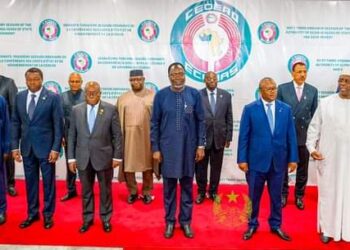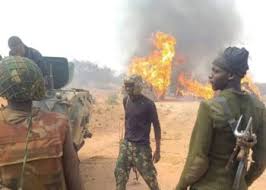There is mounting anxiety and fear as the seven-day ultimatum issued by the Economic Community of West African States (ECOWAS) to Niger’s military junta to reinstate President Mohamed Bazoum or face military actions, expired Sunday.
This is coming as President Bola Ahmed Tinubu met with the five governors of states that share boundary with Niger Republic Sunday.
The governors are Ahmed Aliyu of Sokoto state, Dikko Radda of Katsina state, Idris Nasir Gwandu of Kebbi state, Umar Namadi of Jigawa state and Mai Mala Buni of Yobe state.
The Bazoum government was toppled July 26, following which the ECOWAS rolled out various sanctions and issued threat of military intervention if the military leaders failed to back down.
ECOWAS CDS’ meeting
At an emergency meeting last week, ECOWAS had asked the coup plotters, led by General Abdourahamane Tchiani, to reinstate Bazoum or risk military intervention.
During the meeting, the ECOWAS had asked the Chiefs of Defence Staff (CDS) of member countries to meet and discuss the possibility of military intervention in event of the Nigerien soldiers failing to yield ground and comply with the demands of reinstating the sacked president.
Speaking at the meeting, ECOWAS Commissioner for Political Affairs, Peace and Security, Abdel-Fatau Musah, had said: “We want diplomacy to work, and we want this message clearly transmitted to them (the military) that we are giving them every opportunity to reverse what they have done.
“All the elements that would go into any eventual intervention have been brought out here and been refined, including the timing, the resources needed and the how and where and when we are going to deploy such a force.”
NASS turns down Tinubu
ECOWAS Chair and Nigeria’s President Tinubu had notified the National Assembly last week of the ECOWAS resolutions, including the possibility of troops deployment.
But rather than giving an approval, the Senate advised Tinubu and ECOWAS to explore a political solution to the crisis.
Junta remains defiant
However, with the expiration of the ultimatum Sunday, the Nigerien military regime has remained adamant, vowing not to succumb to pressure from the regional bloc and even described the sanctions imposed by the body as illegal and inhumane.
While urging the Nigerien people to be prepared to defend their fatherland, the military leader got a boost from Burkina Faso, Mali and Guinea (all under military regimes), who expressed their support for the new military regime.
And following closely on the heel of Tinubu’s prayer to the Red Chamber, ECOWAS, last week, deployed two separate delegations to Niamey, the Niger’s capital city, as well as Algeria and Libya.
While former Head of State General Abdulsalami Abubakar led a three-man delegation including Sultan of Sokoto Sa’ad Abubakar III and President of the ECOWAS Commission Omar Touray to Niger, Ambassador Babagana Kingibe was at the head of the delegation to Algeria and Libya, also on the Niger’s political crisis.
Although feelers from Niamey said the Abdulsalami-led team could not meet the head of the junta, but the outcome of the visit was yet to be made public as at the time of this report.
‘Sanctions biting’
And as the ECOWAS seeks to pursue the next line of action, Blueprint gathered that the sanctions imposed by Nigeria and other members’ states opposed to the political crisis in Niger, are beginning to bit harder.
It was also gathered that consequent upon the pronouncement by the ECOWAS, chaired by President Tinubu, members of the Yoruba community in Niamey and other parts of the country are beginning to face hostility from the citizens.
A source who spoke to Blueprint under anonymity last night said: “The threat by ECOWAS as well as sanctions imposed, are causing serious anxiety in Niamey. Sanctions are biting harder as prices of commodities, especially food items are on the high side. The cost of living has gone skyrocketed.
“For instance, the power supply cut off by Nigeria is seriously telling on everyone here in Niger. So also is the closure of borders by both the Nigerian and Nigerien authorities. Indomie noodles and juice that were hitherto coming from Nigeria have stopped, and you know what that means. Even attempt to use the Burkina Faso and Mali by Niger as transit points are not helping the situation in anyway because these two countries are landlocked.
“But in all of this, eyes are on the Yoruba community because of the pronouncement by Tinubu, as some of the citizens believe he is a Yoruba person. So, as I talk to you now, an average Yoruba-speaking person is under threat, people are very hostile. You know they speak Hausa here like Nigeria, so the Hausa man is not facing any hostility, so also are other tribes from Nigeria. In fact, being a Yoruba-speaking person at this time is an anathema. But in fairness, the government is providing necessary security to all, including the embassies.”
Asked why the military leaders failed to back down, our source said: “The people are with them on this and that’s why one is worried on the hardline position taken by ECOWAS and Nigeria. These soldiers don’t really have anything against the ousted President Bouzom. Their target is France; a country they believe is exploiting their uranium and dictating the prices. So, it is more of economic thing than political.”
Anxiety in the North
In a related development, there is also mounting tension in some parts of the northern Nigeria, according to BBC reports.
The declaration of a likely declaration of war is causing some discomfort in view of the close ethnic and historical ties.
In the northern Nigerian city of Sokoto, bordering Niger, which is home to the army’s 8 Division, the anxiety is increasing.
The serenity of Sokoto’s residential neighbourhoods belies the heightened tension in the city and the wider north-western state.
One aspect feeding this is that – according to locals – one in every five residents in Sokoto is from Niger or has connections with the country.
Sokoto city’s sprawling suburb of Sabon-Gari Girafshi is predominantly inhabited by people from Niger.
They fear that military intervention by ECOWAS could greatly affect their family members and even jeopardise their own security here in Nigeria.
For Sulaiman Ibrahim, it’s tension, as he desperately tried to reach one of his wives who is living in Niger.
The fifty-one-year-old jewellery maker lives in one of the fenced and gated compounds.
One of his wives and some of his children are in Niger’s capital, Niamey, trapped there because of last month’s coup.
“Now I want to call my wife Fatima to hear from her, because since the day of that coup, I have not heard from her,” he tells the BBC, gripping his phone in his left hand.
He scrolls through his contacts and dials the wife’s number again.
Each call returns with the same message: “The number you are calling is not available at this time.”
“Every time I called, this is what they’re telling me, either no service or whatever, I don’t know,” he says in anguish, unable to hide his concern.
“If military action is going to be taken on Niger, this will bring more anxiety. I’m in terrible situation because my family is not with me and I don’t have any information about them.”
He opens the photo app on his phone to show his 18-year-old son and one of his siblings.
“Here is my son Mustapha, he’s currently in Niger. This is his younger brother, he’s six years old, they’re with their mother.”
Similarly, Mohamdu Ousman 43 echoed the sentiments of many here that the use of force to restore the ousted president in Niamey could be catastrophic.
“For ECOWAS to go to Niger with the intention to take back power from the military to civilians, we don’t wish for that, God forbid. It’s like erasing our history,” he told the BBC.
Also, Zainab Saidu, 59, hails from the Nigerien city of Dosso, but has lived most of her life in Sokoto after getting married to a Nigerian man. Her youngest son is currently in Niger and she fears for his safety.
“I’m disturbed; I swear we’re in fear all of us, everyone who is from Niger. Everybody is terrified most especially when we heard that Nigeria [might] go to Niger for a war purpose,” she says.
Also hard hit is Ado Garba Dankwaseri, a businessman who has not been able to supply others in the town with ice after the border closed
The 42-year-old often travels into Niger to buy ice blocks to supply to traders in Illela selling water and soft drinks who need to keep things cool.
“I make 100,000 naira ($130; £100) a day with my supplies. But right now, I cannot cross the border. There are soldiers, police and custom and immigration officers stationed everywhere. You cross the border at your own peril,” the ice trader says.
Customs officials met some of the business people in Illela on Friday to try to address their concerns and talk about why the closure was necessary.
“There’s no sacrifice too big as long as they are able to achieve peace and democracy within the sub-region. The community understands the reason behind the border closure,” says Bashir Adewale Adeniyi from the customs service.
(BBC)




